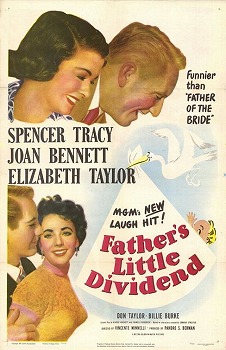Plot
Middle-class family man Stanley Banks learns that his recently married daughter Kay and her husband Buckley Dunstan are expecting a baby. Stanley's wife Ellie and Buckley's parents Doris and Herbert are delighted, but Stanley broods that he is too young and vibrant to be a grandfather.
Ellie throws Kay a baby shower, although Stanley balks at the cost. Ellie suggests that they remodel their house so that Kay, Buckley and the baby can live with them, but Stanley refuses. The Dunstans announce plans to add a wing to their home for the couple, but Kay and Buckley reveal that they have just bought their own house.
After settling into their new home, Kay, who is very close to her father, expresses her concern that the baby will change her relationship with Buckley. Stanley comforts her by telling her how much he had loved her as a baby. Soon the Bankses and the Dunstans are trying to outdo one another buying gifts and making plans for the baby. One night, while listening to Ellie, Doris, and Herbert bicker over the baby's name, Kay becomes upset and only Stanley is able to comfort her. Although he pledges to Kay that the in-laws will not interfere again, Stanley drags Ellie to Kay's physician, Dr. Andrew Nordell.
Things remain calm until Stanley is awakened by a late-night call from Buckley with news that Kay has left him. At the Banks house, Buckley and Kay reconcile after Kay's jealousy is revealed to be a misunderstanding stemming from Buckley's late nights working at the office. Kay and Stanley realize Buckley's devotion to his family.
As the birth approaches, the nerves of the parents and grandparents become frayed. However, the baby cries whenever Stanley comes near him. When the baby is six months old, Kay joins Buckley on a business trip and leaves the baby with her parents, hoping to give Stanley time to grow closer to his grandson. One afternoon, while Kay is still away, Stanley takes the baby for a walk in the park. After joining some boys in a game of soccer, he loses track of time and cannot find the carriage. He frantically retraces his steps back to the house. Seeing through the window that Kay has returned early, he panics and takes a taxi to the police station. Stanley confesses to the police sergeant that he has lost the baby and secretly prays that his grandson will not scream when he holds him. To Stanley's relief, the baby is delighted to see him, and from that moment on, they are devoted to each other.
At the baby's christening, Stanley beams with pride as his grandson is named Stanley Banks Dunstan. [4]
Production
Father of the Bride was such a hit at the box office and with critics that MGM rushed a sequel into production in 1950. Its working title was Now I Am a Grandfather. [5]
Spencer Tracy and Joan Bennett had appeared in films together at Fox two decades earlier, including Me and My Gal , in which their characters marry, and She Wanted a Millionaire .
According to film critic Leonard Maltin, this film was one of the first examples of a modern film sequel. [6]
Reception
The world premiere of Father's Little Dividend was held at Grauman's Egyptian Theatre in Hollywood on April 5, 1951 as a benefit for the John Tracy Clinic. The film was preceded by a screening of the short color film Listening Eyes, which documented the work of the clinic and was produced and funded by Walt Disney. The benefit event was staged by a committee headed by Esther Williams, [1] and the master of ceremonies was George Murphy. Spencer Tracy and his wife addressed the audience, which sang "Happy Birthday to You" to Tracy, as it was his 51st birthday. [7]
In a contemporary review for The New York Times , critic Bosley Crowther called the film "grand diversion" and wrote: "It is not very often that the sequel to a successful film turns out to be even half as successful or rewarding as the original picture was. But we've got to hand it to Metro: its sequel to 'Father of the Bride' is so close that we'll willingly concede it to the humor and charm of that former film. ... Mr. Tracy does a wonderful job of displaying the agonized reactions of a father and a badly baffled man. In him again is superbly mirrored a real American type—slightly prettified and idealized, we'll grant you, but never sugared or overdone." [2]
Critic Edwin Schallert of the Los Angeles Times wrote: "The new film merits approbation as a successful sequel of which there are not too many. It is in many ways more amusing than its predecessor." [7]
According to MGM records, the film earned $3,122,000 in the U.S. and Canada and $1.5 million elsewhere, resulting in a profit of $2,025,000. [3]
This page is based on this
Wikipedia article Text is available under the
CC BY-SA 4.0 license; additional terms may apply.
Images, videos and audio are available under their respective licenses.

